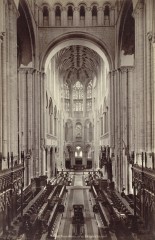 Nothing enshrines so completely the idea of decline as an English cathedral. Millennial in age, monumental in scale, meticulous in decoration, the cathedral is dedicated to a medieval deity. A god of buildings, worshipped through spires and flying buttresses and arches, feared through plaster paintings of devils and awed in roof bosses carved with angels and apostles. A god built by masons and mortar. A god now gone.
Nothing enshrines so completely the idea of decline as an English cathedral. Millennial in age, monumental in scale, meticulous in decoration, the cathedral is dedicated to a medieval deity. A god of buildings, worshipped through spires and flying buttresses and arches, feared through plaster paintings of devils and awed in roof bosses carved with angels and apostles. A god built by masons and mortar. A god now gone.
Mesopotamian ziggurats and Mayan pyramids may have been abandoned to jungle and desert but the church and the English county town allowed cathedrals their continuance. There were no longer cowls in the cloisters, nave walls were scrubbed of paint, brasses lifted from the family tombs, and now dead dukes and earls interred themselves by preference in chapels on their grand estates.
But the church, like ivy, covered up the ambulatory and transepts, its ritual curled along the grave stone paving, up to the great wooden doors that would no longer open to a crowd.
Into the mouth of this godless cavern, divorced from its estates, its wealth, and its power, I came, aged six years old, clutching my father’s hand. Together we walked alone to the song school, down the dark arcade separated from the nave by the worn black tombs of bishops. How like an Angel came I down! How bright are all things here! When first among His works I did appear. O how their glory me did crown!
The church wanted unhappy little boys to sing for god and, in return, it would educate them. My father did not realize that I was Isaac in this bargain. God provided no alternatives. Closer than my hand, he held his own unhappiness and disappointment. And what, after all, do little boys know of sacrifice?
Bullying was worn with the same resignation as the surplice and the ruff. The kick and the rabbit punch on blind corners in procession, the swinging of the heavy silver medals of choral office ensured that the very youngest would arrive swallowing their tears, swearing during the gospel reading to carry forward the punishment to the next arrivals. Bullying was only the background noise of boyhood, the 32′ pipe in our incessant, futile fugue.
This was my education: to stand in a building abandoned by its ideology, kept alive by shadow priests and shadow congregations, and wonder.
ALMIGHTY God we confess that we have sinned against Thee and against our fellow men, in thought and word and deed, in the evil we have done and in the good we have not done, through ignorance, through weakness, through our own deliberate fault.
“The good we have not done.” Every good act precluded a host of better acts. Even to contemplate the order of actions and their goodness was to risk being plunged into a cycle of evaluation and procrastination: the opportunity cost of goodness. The impossibility of goodness. The requirement for worship.
We knew the psalms by length and dreaded day 15. The longest. Every prayer, every liturgy, every lesson passed before us. Lent. Easter. Whitsun. Pentecost. The long weeks of Trinity. Advent. Christmas. Epiphany. Saints days and Sundays.
For an hour each evening, anyone with a mind to could have come to listen to the anthemic counterpoint of Palestrina or Byrd, or the mags and nuncs from England’s age of empire – Stanford in G, Bairstow in D, Sumsion in A.
But in the evenings, nobody came. The green-bound, fine-leaved pages of the English Hymnal were left unthumbed. The kneelers – boldly patterned and strongly stitched – were unneeded. We sang for a few small matrons in sensible shoes who strode to their stations. They positioned themselves like chess pieces, Staunton queens, always leaving enough space between to avoid capture.
The choir filled the stalls, dec and can. We would still have been obliged to sing for no one. These were the rites. Our songs were the sands engulfing the colossal wreck. Nothing beside remained.
This then was my education, conscripted into choral servitude, to serve a church that clung to a building whose stone triforium dwarfed its influence, and mocked its ministry. The curriculum was decline: the sudden ending of a high ascent; progress and its reversal. The lessons were in drowned polyphony; the inescapable punishment of being made to be present, to practise and perform and witness every night the same. I am poured out like water. My country.
3 responses to “Education by evensong”
So my imagining of the halo was not so far off!
But seriously, Julian’s right: this is excellent. Nice one Adrian.
Thanks Lara. And now my memoirs are complete!
I never suffered the bullying – sounds dreadful – but I do remember the boredom of church. Beautifully written and evocative piece Adrian.